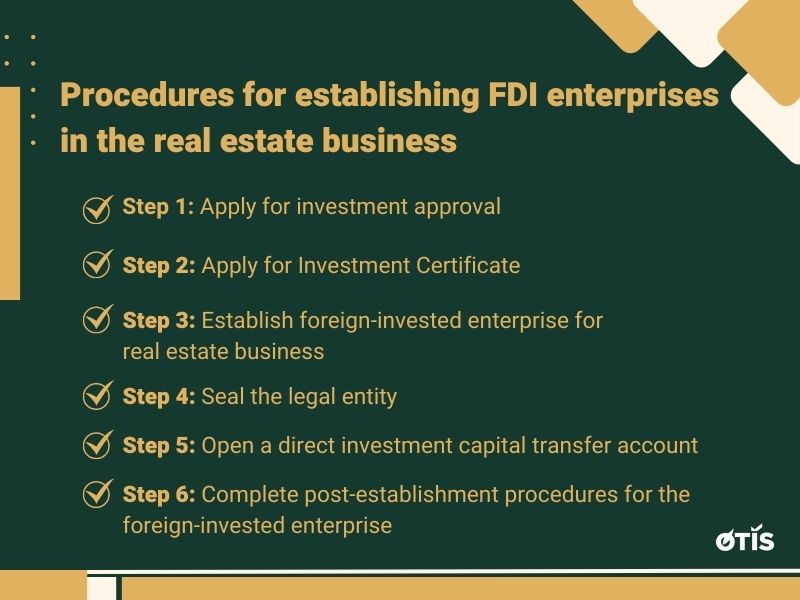The real estate market in Vietnam is attracting a lot of attention from investors. In addition to domestic investors, foreign-invested companies are also accelerating their investments in this sector. So what are the conditions and procedures for FDI enterprises to engage in real estate business in Vietnam? Let’s find out in the following article with OTIS LAWYERS!
Requirements for FDI enterprises to engage in real estate business in Vietnam
According to the provisions of the Law on Investment 2020, when investors establish a foreign-invested company to engage in real estate business, they are no longer required to register a minimum charter capital of 20 billion as before. Instead, they can register the charter capital according to their needs.
However, attention should be paid to the scope of business activities for foreign-invested companies in the real estate sector in Vietnam. According to Article 3, Clause 11 of the Law on Real Estate Business 2014, FDI enterprises engaged in real estate business may operate under the following forms:
- Lease houses or construction works for subleasing.
- For land leased by the State, they may invest in building houses for leasing; invest in building non-residential houses or construction works for purposes other than sale, lease, or lease-purchase.
- Acquire and transfer the whole or part of real estate projects from investors for building houses or construction works for sale, lease, or lease-purchase.
- For land allocated by the State, they may invest in building houses for sale, lease, or lease-purchase.
- For land leased in industrial zones, industrial clusters, export-processing zones, high-tech zones, economic zones, they may invest in building houses or construction works for business purposes in accordance with the designated land use.
Therefore, foreign-invested enterprises are only allowed to engage in real estate business under the aforementioned five forms and are not permitted to engage in real estate business in any other form.
Procedures for establishing FDI enterprises in the real estate business

Step 1: Apply for investment approval
Depending on the scale and characteristics of the investment project, the investment approval decision will be made by the National Assembly, the Prime Minister, or the provincial People’s Committee.
Step 2: Apply for Investment Certificate
– Expected implementation time: 15 working days from the date of receiving the complete dossier.
– Required documents:
- Project implementation proposal according to the provided template.
- Legal status documents of the investor: For individual investors, it is a Passport; for corporate investors, it is a Business License/Incorporation Decision and the Company’s Charter.
- Documents proving the financial capacity of the investor.
- Investment project proposal, including:
- In cases where the investment project does not request the State to allocate land, lease land, or allow land use conversion, a copy of documents proving land use rights or other documents identifying the location for project implementation should be submitted.
- Explanation of the technology used in the investment project for projects subject to appraisal and obtaining opinions on technology transfer as regulated by the laws.
- Build-Transfer (BT) contract for projects implemented under the BT contract form.
- Other documents related to the investment project and requirements regarding the investor’s qualifications and capacity as stipulated by the law (if applicable).
Step 3: Establish foreign-invested enterprise for real estate business
– Licensing authority: Department of Planning and Investment.
– Implementation time: 03 working days.
– Required documents:
- Application form for business registration.
- Company Charter.
- List of members (for multi-member LLCs) or List of shareholders (for joint-stock companies).
- Copies of legal documents of individuals or organizations contributing capital to establish the company.
- Copy of Investment Certificate.
- Copies of legal documents of the legal representative according to the law.
Step 4: Seal the legal entity
After establishment, the enterprise proceeds with sealing procedures. According to the provisions of the Law on Enterprises 2020, enterprises are not required to notify the sample seal to the National Business Registration Portal, but can use it directly.
Step 5: Open a direct investment capital transfer account
According to the provisions of the Law on Enterprises, foreign investors are required to contribute capital within 90 days from the date of being granted the Business Registration Certificate.
Therefore, immediately after establishing the company, foreign investors need to open a direct investment capital transfer account. Although the Investment Law of 2020 has removed the requirement for a minimum charter capital of 20 billion VND for real estate businesses, investors still need to determine a reasonable amount of capital to ensure smooth business operations once the company is in operation.
Step 6: Complete post-establishment procedures for the foreign-invested enterprise
After company establishment, investors proceed with procedures such as registering for digital signatures, paying business license tax, declaring business license tax, issuing invoices, and filing tax declarations.
For any questions or comments, please contact:
OTIS AND PARTNERS LAW FIRM
Office address: K28 – Group K, Lane 68 Trung Kinh, Yen Hoa Ward, Cau Giay District, Hanoi
Email: info@otislawyers.vn
Hotline: 0987748111


 Tiếng Việt
Tiếng Việt 한국어
한국어 中文 (中国)
中文 (中国)